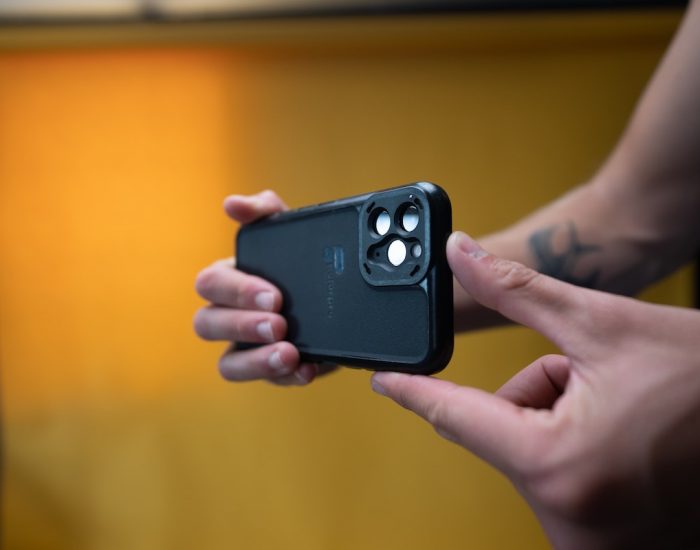Smartphones with a decent camera and the ability to record video are pretty common these days.
Video content creators are finding that using their mobile phones to shoot video has several significant advantages.
Below are some tips to get good quality video and audio for you Deadly Dads Video Comp entry.
#1 – Good Lighting is Critical
Often natural light is best early in the mornings or late afternoon.
Try as much as possible to shoot your video in well lit areas. If shooting indoors avoid windows in the shot if strong light is beaming in.
Try to have sun/strong light shining light onto your subject (rather than having strong light aimed into the camera).
#2 – Shoot in landscape not vertical
Hold your phone horizontally so that videos played back on other screens are in landscape orientation.
#3 Stay Steady
Keep your phone steady while recording. Use both hands to hold your smartphone as close as possible to your body as you record the video or try using a tripod.
#3 Sound matters
Good quality audio can really make a video.
If using an external microphone isn’t possible or practical then stay as close to the audio source as possible and try this little trick: use your hand to cover around the phone’s microphone (but don’t completely cover it). This way, unwanted noise can be reduced.
Also be sure you have permission to use any pre-recorded music or stick to copyright free tracks.
#4 Up Close
Staying physically closer to your subject helps to get better image quality, less digital noise, and better focus in your videos.
# 5 Get Prepped
* Depending on the make and model of your phone, there are plenty of free on-line tutorials and loads more tips and tricks you may like to explore.




Richard’s research revealed possible long-term negative impacts on the children of dads with mental health issues. Fathers’ depressive symptoms in the first year after the birth predicted behaviour problems in their children years later.
“If dads’ mental health has such a dramatic impact then we need to be screening dads for depression, not just mums,” Richard explains.
In response to these limitations, Richard and his team have designed a smart-phone based program that allows mobile connection for new and expectant dads.
Participants receive texts containing information and links, and self-report their mood. If the mood tracker identifies dads as needing extra support, they will be offered a phone call from a counsellor trained in this area.
Following the success of the pilot of the SMS4dads program, Funding was received to enable a National roll-out.
“When dad’s miss antenatal classes or activities, they also miss out on contact and links to other people. They may never get the chance to say to anyone, look I’m really stressed,” he points out.
“SMS4dads is a way of bringing dads into the health system and keeping them linked in with services and support,” explains Richard.
Richard credits a varied career, a talented and innovative team, and much life experience for affording him the insight needed to address the challenges related to actively engaging dads.
After completing his masters in Medical Science, studying epidemiology, Richard earned his PhD focusing on fathers and attachment.
“Fathers are invisible in many places, and that is endemic. Not because people dislike fathers, but because the system is set up to be focused on mothers.”
Some services and organisations are aware of the need to engage dads, but have been unsuccessful in their attempts.
“When people are challenged about this, they generally want dads involved,” Richard affirms.
“Often, however, they just don’t know how to do it.”
Richard works with health professionals on issues related to fathers, and has delivered many antenatal programs for expectant dads.
He credits his own family with giving him an understanding of the role of fathers needed to make his work relevant.
“I have three daughters and two stepdaughters,”
“My kids would say they taught me just about everything I know and they’d be right. They’ve taught me a lot, and still do.”
Richard’s research revealed possible long-term negative impacts on the children of dads with mental health issues. Fathers’ depressive symptoms in the first year after the birth predicted behaviour problems in their children years later.
“If dads’ mental health has such a dramatic impact then we need to be screening dads for depression, not just mums,” Richard explains.
In response to these limitations, Richard and his team have designed a smart-phone based program that allows mobile connection for new and expectant dads.
Participants receive texts containing information and links, and self-report their mood. If the mood tracker identifies dads as needing extra support, they will be offered a phone call from a counsellor trained in this area.
Following the success of the pilot of the SMS4dads program, Funding was received to enable a National roll-out.
“When dad’s miss antenatal classes or activities, they also miss out on contact and links to other people. They may never get the chance to say to anyone, look I’m really stressed,” he points out.
“SMS4dads is a way of bringing dads into the health system and keeping them linked in with services and support,” explains Richard.